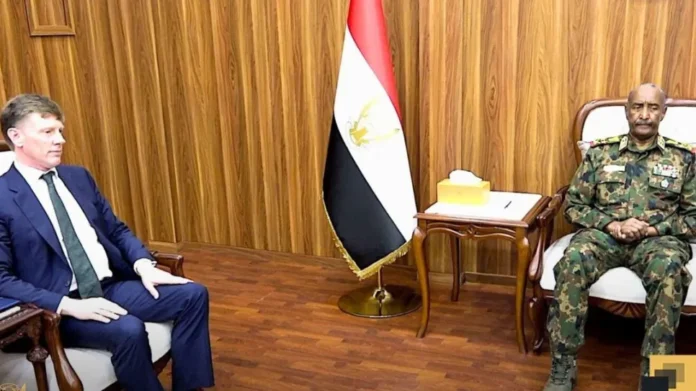Sudan’s Sovereign Council Head Al-Burhan told the British Envoy: “Our people need an end to the Rapid Support Forces (RSF) violations, not conferences.”
The head of Sudan’s Sovereign Council, Abdel Fattah al-Burhan, told the UK’s Special Envoy for Sudan, Richard Cawardine, on Wednesday that “the Sudanese people need a halt to the RSF violations more than they need conferences.”
This occurred during a meeting between Al-Burhan and Cawardine in Port Sudan (northeast), according to the official Sudanese News Agency (SUNA).
The agency mentioned that the British envoy provided an explanation about the London conference that will be held regarding Sudan.
On Sunday, the Sudanese Ministry of Foreign Affairs announced its objection to the UK organizing an international conference on Sudan on April 15 without inviting its government to participate.
According to SUNA, Al-Burhan clarified to the British envoy that “the Sudanese people need the international community to consider their suffering due to the violations committed by the terrorist RSF militia and its supporters.”
It quoted Al-Burhan as saying that “the Sudanese people need a halt to the violations in El Fasher (west) and the displaced persons camps more than they need conferences here and there.”
The head of the Sudanese Sovereign Council pointed to “the targeting of civilian and service facilities and infrastructure projects by the rebel militia (RSF).”
Al-Burhan affirmed to Cawardine “Sudan’s desire for Britain to work through its position in the UN Security Council to change the stereotypical image of the reality of the crisis in the country.”
He called on Britain to “correct its positions based on the historical ties that bind it to Sudan.”
Since April 2023, the Sudanese army and the “Rapid Support Forces” have been engaged in a war that has left more than 20,000 dead and about 15 million displaced persons and refugees, according to the United Nations and local authorities, while a study by American universities estimated the number of deaths at about 130,000.
For his part, the British envoy affirmed, according to the Sudanese agency, that “the international community will unite to support Sudan.”
He mentioned that “the British Foreign Secretary (David Lamy) will host next week with his counterparts in the European Union and the African Union, alongside a number of international organizations, the largest international gathering to support Sudan after the Paris conference that was held last year.”
Cawardine pointed out that the aim of the conference is “to bring peace to the people of Sudan and end the suffering of the Sudanese, and not to impose solutions from the outside.”
He noted that “no Sudanese political body has been invited to this conference.”
For weeks, and at an accelerating pace, the areas controlled by the “Rapid Support Forces” in the states of Sudan have begun to decrease in favor of the army.
In Khartoum State, which consists of 3 cities, the army has tightened its grip on the cities of Khartoum and Bahri, while it controls most parts of the city of Omdurman, with the exception of parts of its west and south.
Since the end of last March, the army’s victories in Khartoum have accelerated, including the control of the Presidential Palace, the headquarters of the ministries in its vicinity, the airport, and security and military headquarters, for the first time since the outbreak of the war two years ago.
In the other 17 states, the “Rapid Support Forces” no longer controls anything other than parts of the states of North Kordofan and West Kordofan, and pockets in the states of South Kordofan and Blue Nile, in addition to 4 of the states of the Darfur region (west).
While the army controls El Fasher, the capital of North Darfur, the fifth and main state in the region


